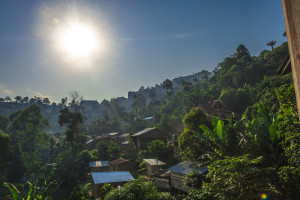
File photo of DRC countryside
Kinshasa/Geneva: The Democratic Republic of the Congo (DRC) has been witnessing recurring incidents of “deadly” ethnically-motivated attacks on internally displaced people’s (IDP) camps by armed groups in the east of the country. Following deadly attacks last week and further attempts over the weekend, there is significant risk that other IDP sites could be attacked as well, United Nations Human Rights warned in Geneva today.
On February 1, 2022, at least 62 internally displaced people, members of the Hema ethnic community, were killed and 38 others injured by the Cooperative for the Development of Congo (CODECO) armed group in a night-time attack on the Plaine Savo IDP camp. All the victims were either shot or attacked with machetes and knives.
The Plaine Savo attack is only the latest in a string of devastating raids on IDP sites by CODECO in Ituri Province, where ethnic tensions between the Hema and Lendu communities have existed for years. Between November 19 and 28, 2021, four other sites were attacked by CODECO, including the village of Drodro. At least 58 people from the Hema community were killed, including at least nine women and four children.
“In total, we documented 10 attacks on IDP sites in 2021 in Ituri, North Kivu and South Kivu, in which at least 106 people were killed, 16 injured and at least seven women subjected to acts of sexual violence,” Liz Throssel, Spokesperson for the United Nations High Commissioner for Human Rights, said here today.
In addition to concerns that other IDP sites could be attacked, particularly Loda and Djaiba, located close to Plaine Savo and hosting members of the Hema community, there is also the grave risk of retaliatory attacks by the Ituri Self-Defense Popular Front (FPAC-Zaire) armed group, which is mainly composed of members of the Hema community.
Noting that the military authorities in the region have launched a preliminary investigation into the devastating attack on Plaine Savo, the UN Human Rights called on the government to guarantee victims’ access to a remedy by ensuring that these investigations are independent, effective and transparent, and to also investigate other attacks on IDP camps and to ensure that those responsible are brought to justice.
“We call on the DRC authorities to urgently strengthen the protection of civilians, including by ensuring the safety and security of IDPs,” Throssel said, adding that her colleagues at MONUSCO stand ready to provide technical and logistical support to the authorities for the investigations and any potential prosecutions.
Even after three weeks, no news about the whereabouts of the abducted Afghan women
Meanwhile, the UN Human Rights stated that nearly three weeks after their disappearance, there was still no news about the whereabouts and well-being of four women activists and their relatives who were detained or abducted in Kabul in connection with the recent women’s rights protests.
In addition to Parwana Ibrahim Khil and Tamana Paryani, who were abducted with their relatives on 19 January, two more women in Kabul – who also reportedly took part in a January 16, 2022 protest on women’s rights – were forcibly taken last week. Reports indicate that Mursal Ayar was taken from her house on February 2, 2022 and Dr Zahra Mohammadi was abducted outside her medical clinic on February 3. There is no information about their whereabouts.
“We are gravely concerned for the safety of the disappeared women and their family members. We continue to press the de facto authorities for information on these cases, and for an effective, transparent investigation. We stress the need to ensure their physical and mental integrity and call for their immediate release,” Throssel said.
– global bihari bureau





